#visa
Artist Visa
Artist Visa in Japan – an ideal choice for those looking to extend their art career into the rich landscape of Japanese arts and culture. Learn about this visa, which also offers a pathway for self-sponsorship.
Artist Visa in Japan – an ideal choice for those looking to extend their art career into the rich landscape of Japanese arts and culture. Learn about this visa, which also offers a pathway for self-sponsorship.
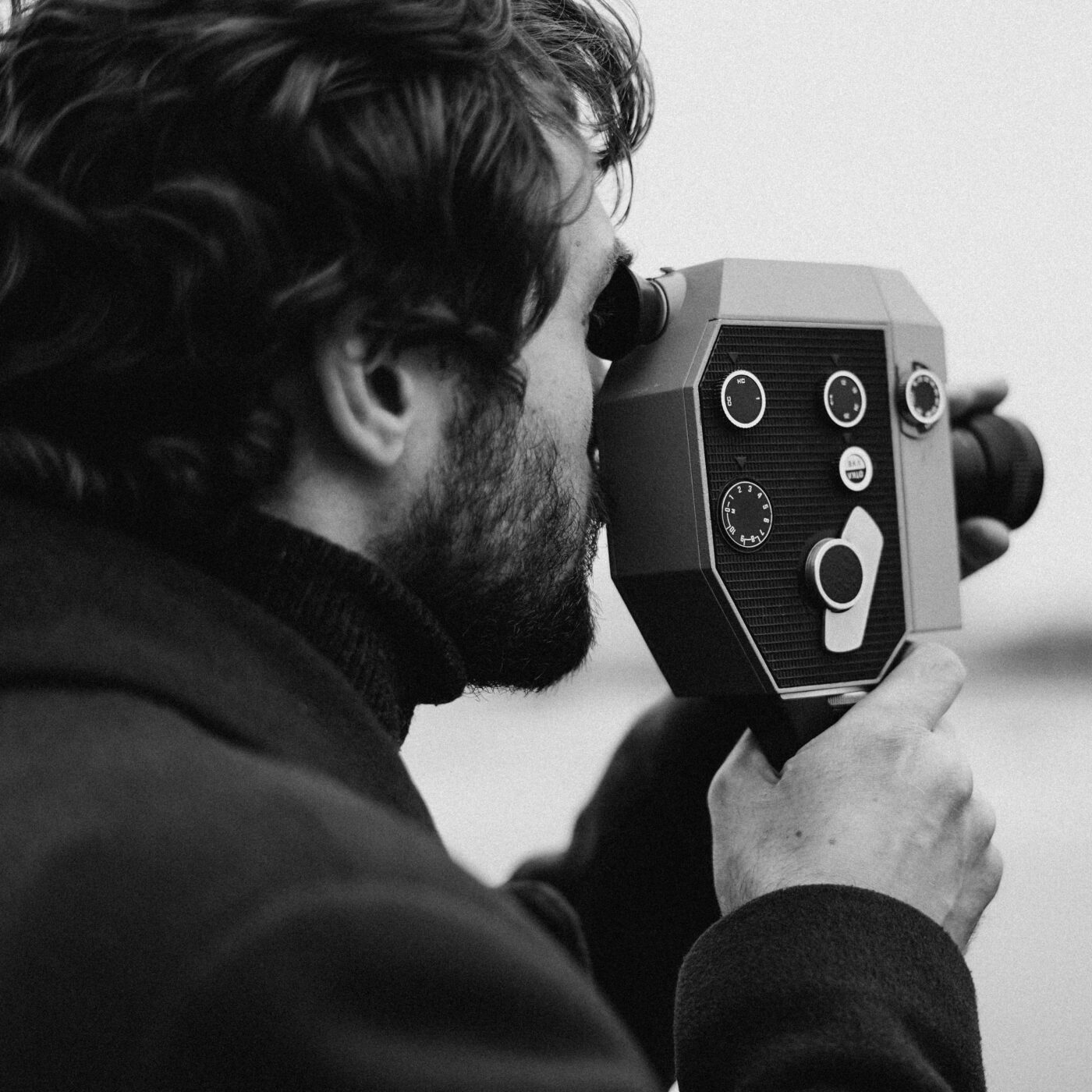
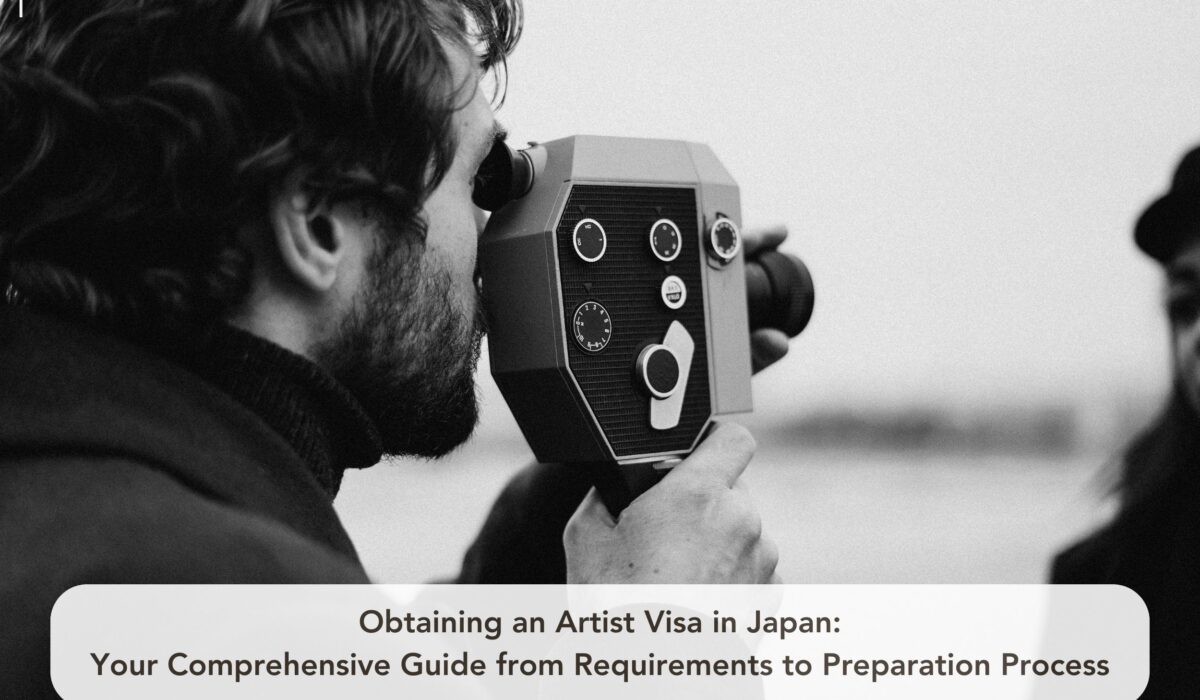
An Artist Visa is for individuals with a proven background in a specific field of art. You must demonstrate past achievements, a stable income from that same artistic field, and a planned continuation of those activities in Japan to support their living expenses.
The Artist Visa can be either employer-sponsored or self-sponsored, although self-sponsorship is generally more difficult. In both cases, you have to provide contracts or purchase orders to show that you will have sufficient income from your artistic activities in the coming years.
The processing time for the Artist Visa can vary from 3 to 4 months (as of November 9th, 2025).
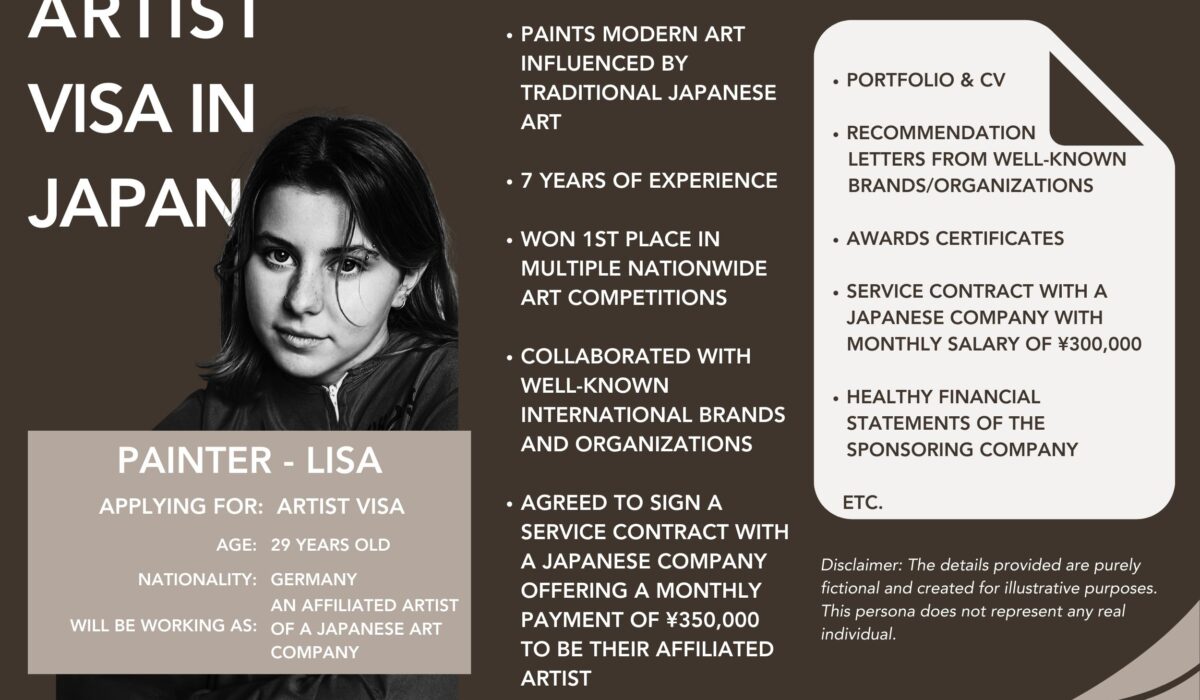
Hypothetically, someone like Painter Lisa (a fictional character created to illustrate a strong visa application) with the provided profile and set of documents could be eligible for an Artist Visa. Lisa has opted to become an affiliated artist working for a Japanese company, creating artwork for both the company and its clients.
The contract ensures a monthly payment of 300,000 yen, a reasonable amount given that her anticipated living expenses (around ¥180,000 per month) can be easily covered by this income. Lisa’s achievements are substantiated by her award certificates and recommendation letters.
While a visa approval is never guaranteed, considering the profile should theoretically meet the requirements.
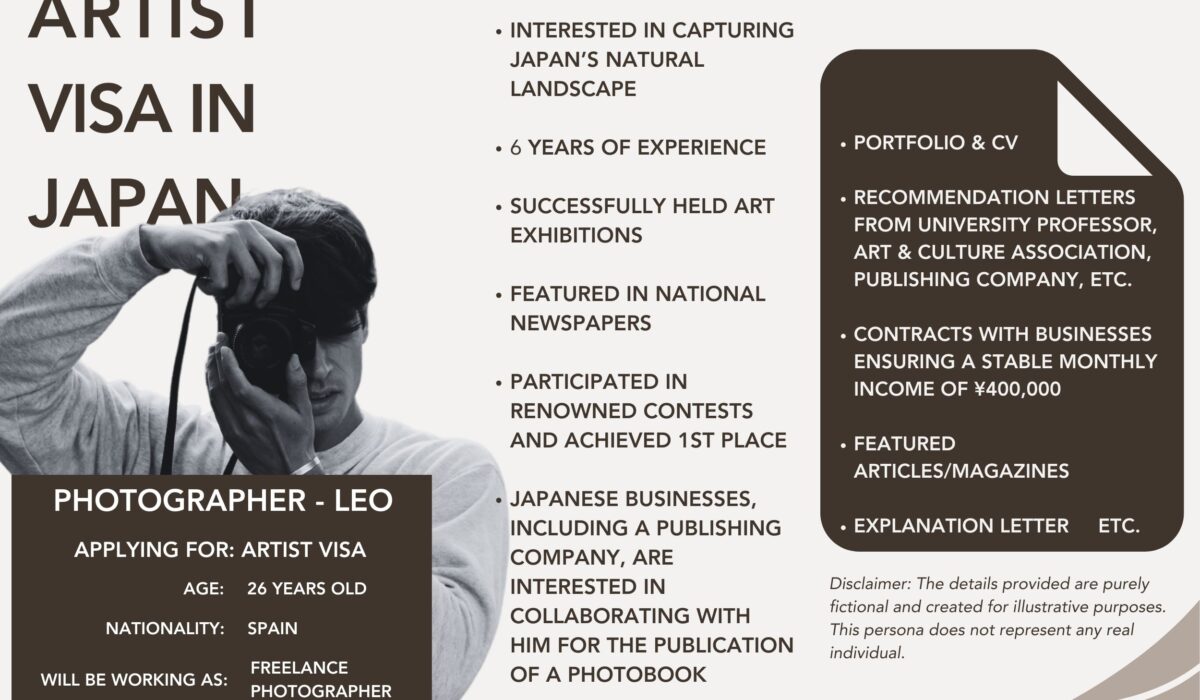
Similarly, another fictional character, Photographer Leo, aspires to become an independent/freelance artist in Japan. For his visa application he can prepare contracts with Japanese companies interested in collaborating with him, providing evidence of a stable monthly income averaging ¥400,000 per month for the upcoming year. Leo can also submit copies of articles featuring his art exhibitions and his collaboration with a well-known Spanish publishing company.
While obtaining a visa becomes more challenging for freelancers, it is not impossible. The key lies in creating a strong and convincing case that fulfills the requirements of the Artist Visa, a topic we will delve into later in the article.
An Artist Visa covers various income-generating activities in music, art, literature, and other artistic areas. It is different from other types of visas such as Entertainment Visa, Instructor Visa, and Professor Visa, so be aware of these distinctions.
Disclaimer: At Small Seasons & Co., we do not handle Entertainer Visas at this time. Entertainer Visa cases typically involve urgent timelines and unique requirements, and we want to ensure we only take on applications we can support with full confidence and quality.
That said, we can support clients whose primary activity falls under the Artist Visa category, but who occasionally wish to engage in activities that fall under the Entertainer Visa scope.
For example, if a composer comes to Japan primarily to create and produce music, but also plans to perform at a limited number of events, we can assist with obtaining the Artist Visa as well as the necessary permission for live performances as a secondary activity.
Eligible professions for an Artist Visa include, but are not limited to*:
Generally, an Artist Visa does not cover individuals whose main activities involve entertainment or live public performances such as theater, musical performances, sports, and other similar performance-based activities.
It also does not typically apply to the following professions, which are more commonly categorized under the Entertainer Visa:
Professions/Activities not covered by an Artist Visa:
To obtain an Artist Visa in Japan, there are primary requirements that you must fulfill, and you will need to substantiate these points with supporting evidence.
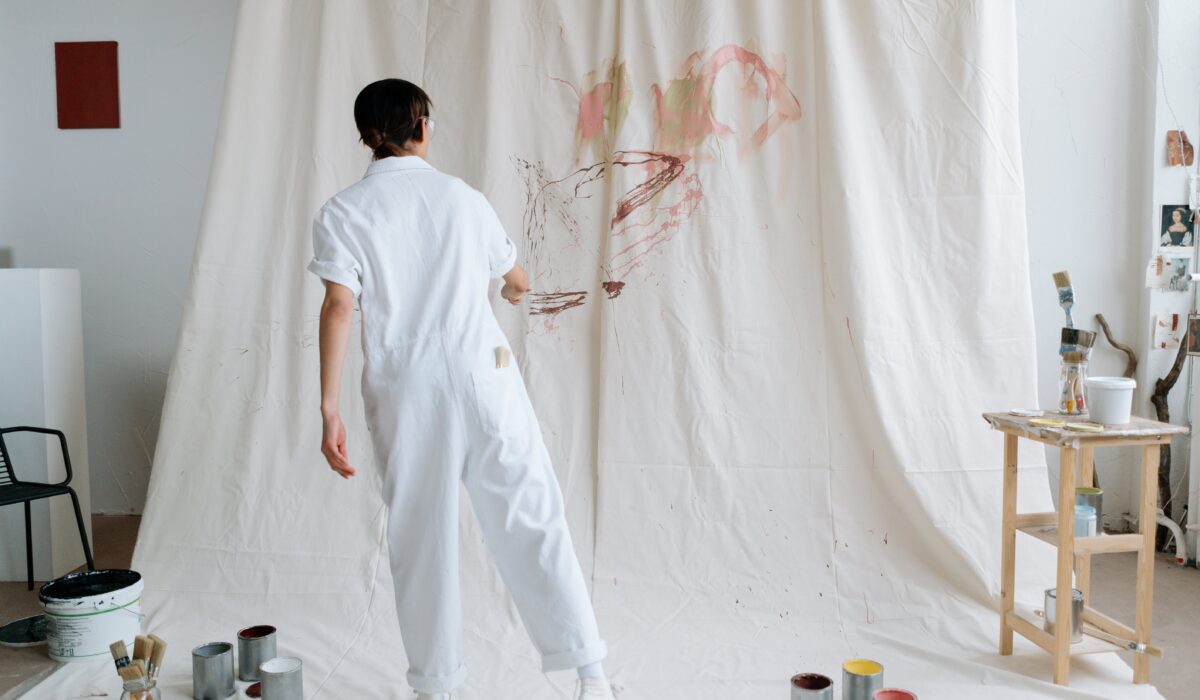
Can you sustain yourself in Japan solely through income generated from your artistic activities? You have to be able to demonstrate sufficient income to cover your living expenses in Japan.
Income can be proven through:
Service contracts or employment agreements with a sponsoring organization (providing regular income), or
Contracts and purchase orders from clients who will pay for your work in Japan
Your income must also come primarily from one artistic field in which you already have experience and recognized achievements. For example, if you are an established writer, your planned activities in Japan should also be related to writing; your projected income from your artistic work cannot be combined with rental income from property overseas to show financial eligibility.
Providing evidence of past artistic activities that contribute to your stable income is vital. This can be established through accomplishments such as winning well-known awards or competitions.
Ensure that your activities indeed fall under the Artist Visa category and not under the Entertainment, Instructor, or Cultural Activities Visa.
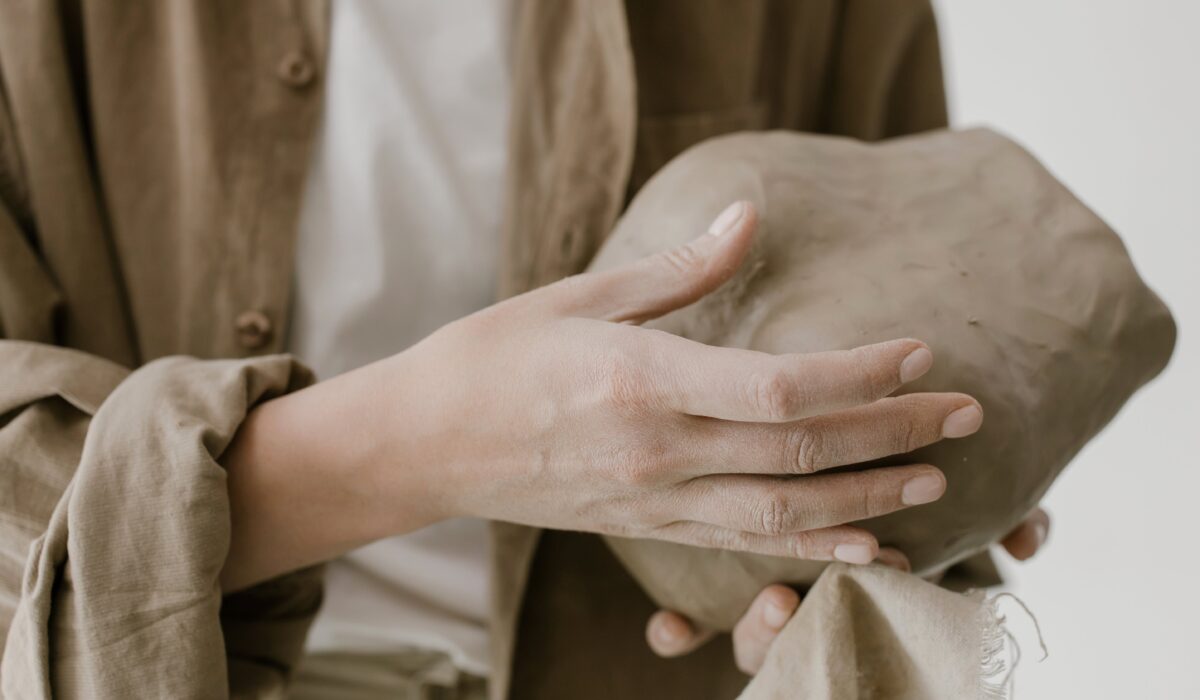
While the process is more challenging, it is technically possible to apply for an Artist Visa in Japan without a company sponsor. In other words, the Artist Visa is one of the few visa types in Japan that can allow self-sponsorship.
Self-sponsored applications are typically reviewed more strictly than company-sponsored ones. You must be fully prepared in terms of documentation and eligibility. However, the flexibility and independence it offers can be valuable.
You will also be required to establish yourself as a sole proprietor (kojin jigyo) in Japan. This means registering through a tax accountant (or by yourself), taking responsibility for your own tax filings, and managing your tax payments properly.
If you already have your own client base and are considering applying for a self-sponsored Artist Visa, we recommend taking a step back to evaluate whether your primary activities are truly artistic in nature, or if you are going to be operating a business.
Under an Artist Visa, you are expected to work as an individual artist within the scope of a sole proprietorship. There is no strict definition that clearly separates “artist work” from “business operation” (after all, artists do need to manage their own careers!). However, if your activities involve hiring staff, outsourcing a significant amount of work, or managing operations similar to a business owner, immigration may view your work as business management rather than artistic activity.
If Immigration Bureau determines that your business activities are too extensive to be a sole proprietor there is always a possibility that they may advise you to change your status to a Business Manager Visa, which requires establishing a legal entity (such as a Godo Kaisha or Kabushiki Kaisha).
Portrait photo (4cm x 3cm) meeting the specified requirements
One of the following documents based on your situation:
a. If applying based on a contract with a public/private institution or individual:
Document certifying the content, period, status, and remuneration of the activity.
b. If your application is not based on a contract with a public or private institution or individual:
Document prepared by the applicant stating the details of the specific activity, its period, and the estimated amount of income generated from the activity (you may write in an appropriate format).
Resume providing a comprehensive history of artistic activities
Recommendation letters, portfolio, and documents showcasing achievements such as prizes, competition wins, featured articles, etc.
Reference: Ministry of Justice – Artist VIsa
The required documents may vary depending on the case, so consult with us to get a customized list for your case.
It varies but usually takes 3 month to 4 months, it could take longer depending on the case.
For an Artist Visa, the granted period can be 3 months, 1 year, 3 years, or 5 years.
For your initial application, you are likely to receive a stay of just one year, unless you have a three-year-long exhibition or a permanent contract with a well-known and financially stable Japanese company.
The period of stay is not chosen by the applicant; it is determined based on the strength of your application, including your achievements, your planned activities, and the reasons you need to be in Japan.
When applying for a visa renewal, in addition to the documents copied below, you will need to submit your Resident Taxation Certificate and Resident Tax Payment Certificate to demonstrate your income for the previous year.
The immigration bureau may also request additional documents as part of their application review process.
a. If applying based on a contract with a public/private institution or individual:
Document certifying the content, period, status, and remuneration of the activity.
b. If your application is not based on a contract with a public or private institution or individual:
Document prepared by the applicant stating the details of the specific activity, its period, and the estimated amount of income generated from the activity.
As a general rule, if you have accumulated 10 years of consecutive residence in Japan, including 5 years under the Artist Visa, and fulfill other multiple requirements, you can apply for a Permanent Resident Visa.
While there are technically a few pathways to obtain an Artist Visa, if you are applying from overseas, we at Small Seasons & Co. generally advise our clients to secure a contract with a company based in Japan or overseas. If it is a Japanese company, it is better as it provides a solid reason for your stay in Japan.
“Why do you need to stay in Japan?” is an important question we need to answer in the application.
This contract could be an employment contract, a service contract, or multiple service contracts, but it needs to demonstrate that you will have a monthly income of around 250,000 yen.
Artist visa applications tend to be high volume, with recommendation letters, portfolios, featured articles, etc.
However, immigration officers will not have time to go through all of these, and they could dilute the strongest part of your application.
Focus on your best work, clients, and achievements, and make sure that you have clear, accurate documents prepared. This is your ultimate path to succeeding in the application.
When it comes to the Artist Visa application, they will look at your financial stability as an artist. Can you prove your ability to be financially independent solely from your artistic activity?
Could you replicate that in Japan and prove it?
This depends not only on your ability but also on your organizational skills to have these “proofs” readily available.
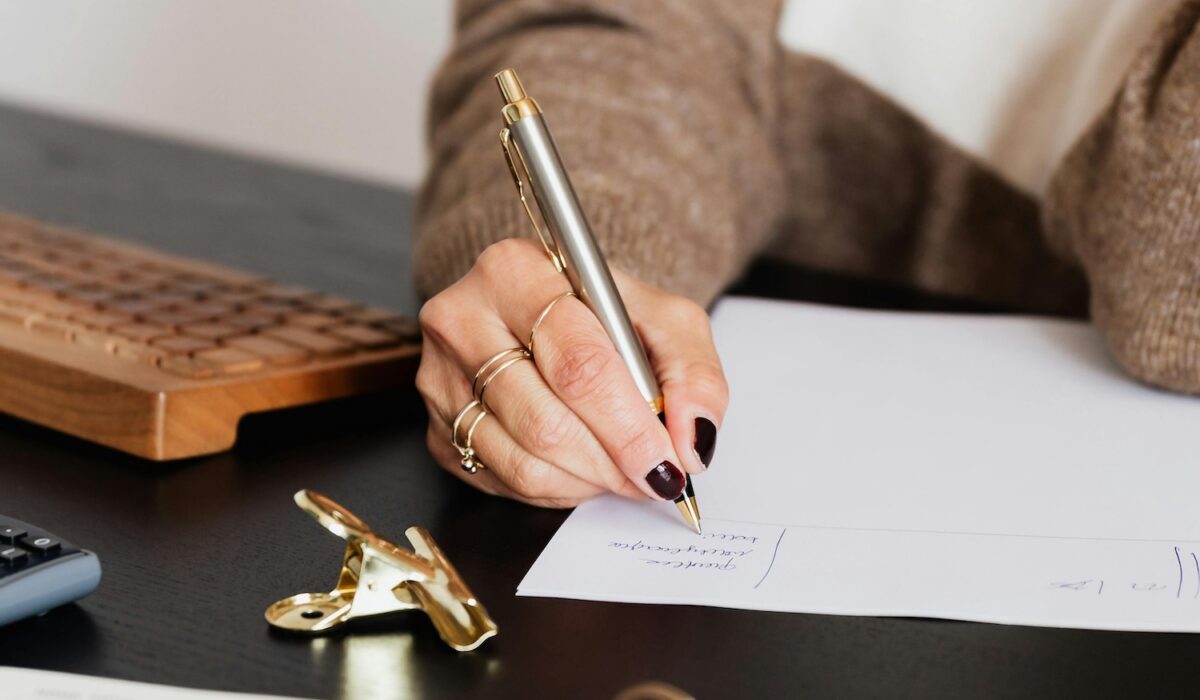
At Small Seasons & Co., we provide support from the initial consultation to the actual application process. What sets us apart is our understanding of the value of art. We encourage artists to come to Japan and contribute to its cultural scene, benefiting both Japanese cultures and talented artists who respect and want to explore Japanese arts and cultures.
Instead of only providing simple “yes” or “no” answers, we aim to find the best way to help you achieve your goals. Whether you seek to continue your artistic activity in Japan, reach a new audience, or explore different opportunities, we work with you to develop strategies tailored to your needs.
Initial Consultation:
Engage in an initial paid consultation to discuss your needs.
Estimation Confirmation:
Review and confirm the estimate issued by Small Seasons & Co.
Contract Signing and Advance Payment (70% of the full amount):
Sign the contract and make the required advance payment.
Strategy Session:
Participate in in-depth discussions regarding timelines and required materials. This might already be covered in the initial consultation.
Document Collection and Signing:
Obtain necessary items and complete the required document signings.
Certificate of Eligibility (COE) Application Submission:
Small Seasons & Co. will manage the submission of your COE application.
Feedback on COE Results:
Receive feedback on the COE application results; if approved, the original copy will be delivered to your address.
Final Invoice (30% of the full amount) Issuance:
Receive the final invoice for the services provided.
Japanese Visa Issuance:
Take the COE to a Japanese embassy/consulate in your home country to obtain your visa. You will need to be physically in Japan if you are sponsoring yourself.
Entry into Japan:
Enter Japan within 90 days of the COE issuance.
